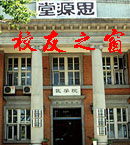Sons chose to die for filial piety,
Ministers willing to give their lives for allegiance.
I am willing to die for both!
Our sacred land is torn in pieces,
Moral integrity is rarely found among officials,
Loyalty and righteousness missing for His Majesty.
They have lost unyielding and upright virtues.
Zhang Xun condemned the rebels,
Xu Yuan died for loyalty to the Emperor,
Their names are remembered forever in history.
Those who came after them Lack the loyal zeal
And the unbending character as tempered steel.
Life like a flame flashing passes away soon,
A man should do something spectacular, shine or rain.
If Zhang and Xu had betrayed the country,
Succumbed to the foe,
They would have been reviled,
Never be crowned in history with glory.
Their temple deep and serene,
Their statues are dignified and awe-inspiring.
The crows and the setting sun witness all the years.
Near this post-house,
Should a traitor pass by the temple,
Let him open his eyes and look back on his treachery!
 【詩人簡介】文天祥(1236年6月6日-1283年1月9日),初名云孙,字宋瑞,又字履善。自号浮休道人、文山。江南西路吉州庐陵县(今江西省吉安市青原区富田镇 )人,汉族江右民系,南宋末年政治家、文学家,民族英雄,与陆秀夫、张世杰并称为“宋末三杰”。宋理宗宝祐四年(1256年),二十一岁的文天祥中进士第一,成为状元。一度掌理军器监兼权直学士院,因直言斥责宦官董宋臣,讥讽权相贾似道而遭到贬斥,数度沉浮,在三十七岁时自请致仕。德祐元年(1275年),元军南下攻宋,文天祥散尽家财,招募士卒勤王,被任命为浙西、江东制置使兼知平江府。在援救常州时,因内部失和而退守余杭。随后升任右丞相兼枢密使,奉命与元军议和,因面斥元主帅伯颜被拘留,于押解北上途中逃归。不久后在福州参与拥立益王赵昰为帝,又自赴南剑州聚兵抗元。景炎二年(1277年)再攻江西,终因势孤力单败退广东。祥兴元年(1278年)卫王赵昺继位后,拜少保,封信国公。后在五坡岭被俘,押至元大都,被囚三年,屡经威逼利诱,仍誓死不屈。元至元十九年十二月(1283年1月),文天祥从容就义,终年四十七岁。明代时追赐谥号“忠烈” 。文天祥多有忠愤慷慨之文,其诗风至德祐年间后一变,气势豪放,允称诗史。他在《过零丁洋》中所作的“人生自古谁无死,留取丹心照汗青”,气势磅礴,情调高亢,激励了后世众多为理想而奋斗的仁人志士。文天祥的著作经后人整理,被辑为《文山先生全集》。
【詩人簡介】文天祥(1236年6月6日-1283年1月9日),初名云孙,字宋瑞,又字履善。自号浮休道人、文山。江南西路吉州庐陵县(今江西省吉安市青原区富田镇 )人,汉族江右民系,南宋末年政治家、文学家,民族英雄,与陆秀夫、张世杰并称为“宋末三杰”。宋理宗宝祐四年(1256年),二十一岁的文天祥中进士第一,成为状元。一度掌理军器监兼权直学士院,因直言斥责宦官董宋臣,讥讽权相贾似道而遭到贬斥,数度沉浮,在三十七岁时自请致仕。德祐元年(1275年),元军南下攻宋,文天祥散尽家财,招募士卒勤王,被任命为浙西、江东制置使兼知平江府。在援救常州时,因内部失和而退守余杭。随后升任右丞相兼枢密使,奉命与元军议和,因面斥元主帅伯颜被拘留,于押解北上途中逃归。不久后在福州参与拥立益王赵昰为帝,又自赴南剑州聚兵抗元。景炎二年(1277年)再攻江西,终因势孤力单败退广东。祥兴元年(1278年)卫王赵昺继位后,拜少保,封信国公。后在五坡岭被俘,押至元大都,被囚三年,屡经威逼利诱,仍誓死不屈。元至元十九年十二月(1283年1月),文天祥从容就义,终年四十七岁。明代时追赐谥号“忠烈” 。文天祥多有忠愤慷慨之文,其诗风至德祐年间后一变,气势豪放,允称诗史。他在《过零丁洋》中所作的“人生自古谁无死,留取丹心照汗青”,气势磅礴,情调高亢,激励了后世众多为理想而奋斗的仁人志士。文天祥的著作经后人整理,被辑为《文山先生全集》。



